
The Missing Partners is a 1928 mystery detective novel by the British writer Henry Wade. It was his second novel following his successful debut The Verdict of You All in 1926.
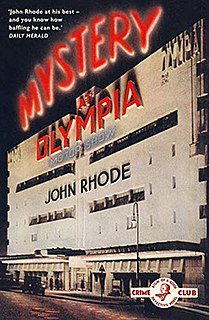
Mystery at Olympia is a 1935 detective novel by John Rhode, the pen name of the British writer Cecil Street. It is the twenty second in his long-running series of novels featuring Lancelot Priestley, an armchair detective who was able to solve mysteries without visiting the scene of the crime. It was published in the United States under the alternative title Murder at the Motor Show.

In Face of the Verdict is a 1936 detective novel by John Rhode, the pen name of the British writer Cecil Street. It is the twenty fourth in his long-running series of novels featuring Lancelot Priestley, a Golden Age armchair detective. Unusually in the series Priestley takes a more active role in the investigation himself, rather than solving it from a detached distance. It was not published in the United States until 1940, by Dodd Mead, with the slightly altered title of In the Face of the Verdict.

Murder at Lilac Cottage is a 1940 detective novel by John Rhode, the pen name of the British writer Cecil Street. It is the thirty third in his long-running series of novels featuring Lancelot Priestley, a Golden Age armchair detective. In the Times Literary Supplement reviewer Maurice Willson Disher noted "With both ingenuity and originality at command, he will keep puzzle-solvers guessing until it pleases Dr. Priestley to explain why clues are not what they seem." while Ralph Partridge gave it a broadly positive review in the New Statesman.

Death of an Author is a 1947 detective novel by John Rhode, the pen name of the British writer Cecil Street. It is the forty fifth in his long-running series of novels featuring Lancelot Priestley, a Golden Age armchair detective. The New Yorker described it as "Rather pleasant, in a ponderous fashion" while Will Cuppy, writing in the New York Herald Tribune, felt "Mr. Rhode provides one of those satisfying British stories in the old tradition, full of mystery meat and brain-work."
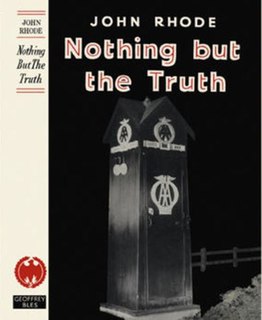
Nothing But the Truth is a 1947 detective novel by John Rhode, the pen name of the British writer Cecil Street. It is the forty forth in his long-running series of novels featuring Lancelot Priestley, a Golden Age armchair detective.

Death in Harley Street is a 1946 detective novel by John Rhode, the pen name of the British writer Cecil Street. It is the forty third in his long-running series of novels featuring Lancelot Priestley, a Golden Age armchair detective. Several sources consider it to be the author's masterpiece.
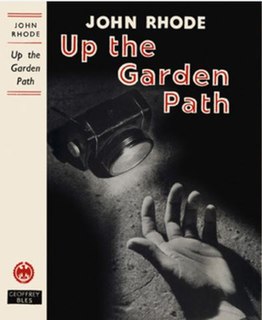
Up the Garden Path is a 1949 detective novel by John Rhode, the pen name of the British writer Cecil Street. It is the forty ninth in his long-running series of novels featuring Lancelot Priestley, a Golden Age armchair detective. It was published in America by Dodd Mead under the alternative title The Fatal Garden. Reviewing the novel in The Observer, Maurice Richardson concluded "Mr. Rhode has lost very little of his grip."
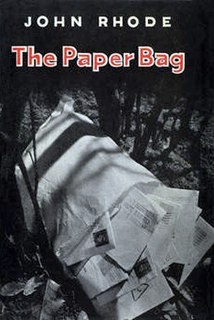
The Paper Bag is a 1948 detective novel by John Rhode, the pen name of the British writer Cecil Street. It is the forty sixth in his long-running series of novels featuring Lancelot Priestley, a Golden Age armchair detective. It was published in America by Dodd Mead under the alternative title The Links in the Chain.

The Two Graphs is a 1950 detective novel by John Rhode, the pen name of the British writer Cecil Street. It is the fiftieth in his long-running series of novels featuring Lancelot Priestley, a Golden Age armchair detective. It was published in America by Dodd Mead under the alternative title Double Identities. Writing in The Observer Maurice Richardson noted a "slight slackening of tension towards the finish but an excellent specimen of Rhode’s later period."
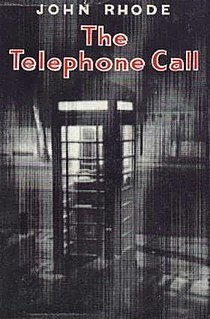
The Telephone Call is a 1948 detective novel by John Rhode, the pen name of the British writer Cecil Street. It is the forty seventh in his long-running series of novels featuring Lancelot Priestley, a Golden Age armchair detective. It was published in America by Dodd Mead under the alternative title Shadow of an Alibi. It is based on the real-life Wallace Case of 1931 in which William Herbert Wallace was convicted of murdering his wife Julia, a conviction which was later overturned on appeal.
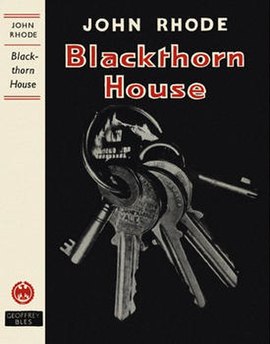
Blackthorn House is a 1949 detective novel by John Rhode, the pen name of the British writer Cecil Street. It is the forty eighth in his long-running series of novels featuring Lancelot Priestley, a Golden Age armchair detective.

Vegetable Duck is a 1944 detective novel by John Rhode, the pen name of the British writer Cecil Street. It is the fortieth in his long-running series of novels featuring Lancelot Priestley, a Golden Age armchair detective. The title refers to a dish including a Marrow stuffed with minced beef, which features in the plot. It has been described as "one of the oddest titles for a detective novel in the genre". Although written during wartime, the setting was post-war. It was published in America by Dodd Mead under the alternative title Too Many Suspects.
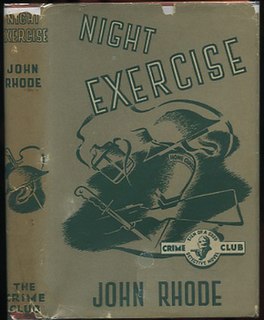
Night Exercise is a 1942 detective novel by John Rhode, the pen name of the British writer Cecil Street. It is a stand-alone wartime novel from Rhode, best known for his long-running series featuring Lancelot Priestley. It was published in America by Dodd Mead under the alternative title Dead of the Night.

Death Invades the Meeting is a 1944 detective novel by John Rhode, the pen name of the British writer Cecil Street. It is the thirty ninth in his long-running series of novels featuring Lancelot Priestley, a Golden Age armchair detective. Reviewing the novel for the Times Literary Supplement Maurice Willson Disher noted "His ingenuity is becoming as delicate to handle as high explosive. His stories may become so difficult to review without saying too much that his triumph will come when they cannot, for discretion’s sake, be reviewed at all."

Family Affairs is a 1950 detective novel by John Rhode, the pen name of the British writer Cecil Street. It is the fifty first in his long-running series of novels featuring Lancelot Priestley, a Golden Age armchair detective. It was published in America by Dodd Mead under the alternative title The Last Suspect. It has been described as "probably the best post-war Rhode novel".
The Secret Meeting is a 1951 detective novel by John Rhode, the pen name of the British writer Cecil Street. It is the fifty second in his long-running series of novels featuring Lancelot Priestley, a Golden Age armchair detective. It was published in America the same year by Dodd Mead. Unusually for the series it has an early Cold War element.

The Lake House is a 1946 detective novel by John Rhode, the pen name of the British writer Cecil Street. It is the forty second in his long-running series of novels featuring Lancelot Priestley, a Golden Age armchair detective. It was his first novel after returning to his original publisher Geoffrey Bles after all his books between 1931 and 1945 had been published by Collins. His other series featuring Desmond Merrion continued to be released by Collins.
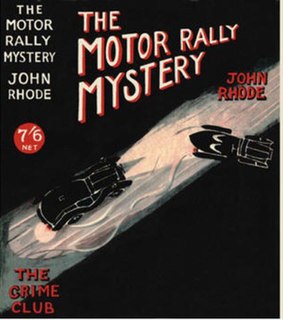
The Motor Rally Mystery is a 1933 detective novel by John Rhode, the pen name of the British writer Cecil Street. It is the fourteenth in his long-running series of novels featuring Lancelot Priestley, a Golden Age armchair detective. It was published in the United States by Dodd Mead under the alternative title Dr. Priestley Lays a Trap. It takes place against the backdrop of the real life RAC Motor Rally, which concluded at Torquay.
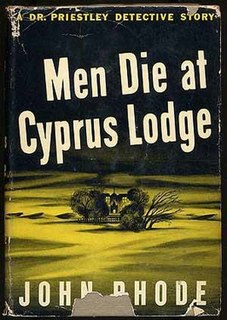
Men Die at Cyprus Lodge is a 1943 detective novel by John Rhode, the pen name of the British writer Cecil Street. It is the thirty eighth in his long-running series of novels featuring Lancelot Priestley, a Golden Age armchair detective. Reviewing it for the San Francisco Chronicle, Anthony Boucher wrote "at his best, nobody can touch Rhode for ingenious murder gadgets and very few can top him for meticulous unravelling; he's very close his best in this one".



















